Editorial on Banking the Unbanked

This article was originally drafted by the African Center for Economic Transformation for the newsletter “West Africa Trends” as part of the Rockefeller Foundation’s Searchlight Process. For more Searchlight content on futurechallenges.org, please click here.
Over the past decade West African policymakers and financial regulators have been recognized for their success in reforming the banking systems across the region. In many countries these reforms have accelerated competition and growth of the sector. The impact of this success however has been limited, because the system still serves only a minority of the population—about 20% in total. As a result, savings rates are low, lending possibilities are constrained and interest rates usurious. This system is a bad deal for the unbanked, the banking system and the economy. The challenge now for governments and policy makers is to find new strategies that harness the potential offered by the 80% unbanked, and allows them to play more significant roles in capital formation.
The problem, however, goes beyond just efficiency and capital formation. The current structure of the banking system itself also perpetuates growing inequalities: those on higher incomes will have access to more financing opportunities, while the poor are left to contend with exploitative practices often associated with informal financial systems. We believe that a healthy banking ecosystem comprising of big, specialist and small banks that can serve the broad spectrum of the population and businesses is needed across West Africa.

Building of the Ghana Commercial Bank (en) in Accra, Ghana. By Elegant Machines [CC-BY-SA-2.0 (www.creativecommons.org/licenses/by-sa/2.0)], via Wikimedia Commons
Recent trends indicate that such an ecosystem is beginning to emerge. In particular, innovations in mobile banking are making it more profitable for banks to provide services for the poor. Though it is still too early to determine the trajectory of this new ecosystem the signs are positive for banking the unbanked. Our futures analysis tells us that, increasingly, bridges are being built between the formal and informal sectors and banks are conspicuous at the forefront of that change. They are helping to create more scope to develop sustainable and equitable financial products and services for everyone. The shifts are happening because banks are:
- Building on existing traditional practices and interfacing with microfinance. There are trends here that are likely to grow as banks target the micro, small and medium sized enterprises (MSME’s) and experiment with indigenous financial systems such as “Susu”;
- Developing specialist products which promote inclusion – such as the spread of ‘non-interest’ Islamic banking products and services across the region.
- Applying mobile technologies to extend reach and range of services. Here, telecommunications companies have led the way in developing mobile banking platforms, forcing conventional banks to follow suit.
However, this emerging ecosystem can only be sustained through a more effective regulatory framework that creates incentives for more innovation and growth. And while regulations and innovations are necessary, these alone are not sufficient to transform the banking landscape to serve the poor better. The reason is that banking is primarily about trust. The poor do not trust banking systems and the banking systems also do not trust the poor. To bridge this deficit of trust it is not enough to license credit bureaus to assess customers who do not operate in formal systems. Instead existing traditional systems are better able to transmit information about creditworthiness. Banks are beginning to tap into these systems, recognizing that the old vetting systems for providing credit to start-ups may be flawed. The Standard Bank group is now launching a sophisticated, culturally-sensitive psychometric assessment tool that is fully automated. The new system places more emphasis on the personal qualities and character strengths of the entrepreneur asking for a new business loan; so, in a sense, banks are no longer betting on the qualities of the horse (i.e business) but rather on the strengths of the jockey (i.e the entrepreneur).
The sector can help itself further by supporting education programmes that promote better financial literacy for low-income communities. This can help change perceptions about what the formal banking sector has to offer them. A key contact point for future interventions should be the “susu” collectors, the trusted personal bankers of the poor in many West African countries. Putting the Susu collectors at the heart of any interventions designed in the future will be a visible signal that the interests of the poor are at the heart of their engagement with the formal banking sector.
